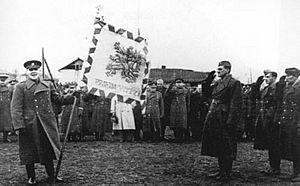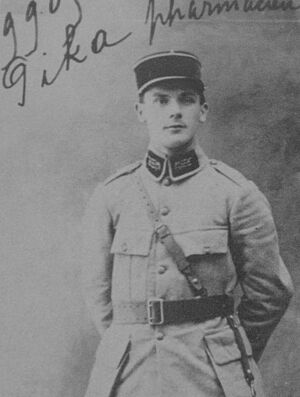Heliodor Píka facts for kids
Quick facts for kids
Heliodor Píka
|
|
|---|---|

Brigadier General Heliodor Píka holds the battle flag of the Czechoslovak 2nd Airborne Brigade.
|
|
| Born | 3 July 1897 Štítina, Austrian Silesia, Austria-Hungary |
| Died | 21 June 1949 (aged 51) Plzeň, Czechoslovakia |
| Allegiance | Czechoslovakia |
| Service/ |
Czechoslovak Legions French Army Czechoslovak Army |
| Years of service | ≈34 |
| Rank | General (promoted posthumously) |
| Commands held | Chief of mission to the USSR Deputy chief of the general staff of the Czechoslovak Army |
| Awards | Milan Rastislav Stefanik Order, 3rd class Order of the White Double Cross, 1st Class |
General Heliodor Píka was a brave Czechoslovak army officer. He lived from 1897 to 1949. Sadly, he was the first person unfairly put on trial and executed by the Communist government in Czechoslovakia. These unfair trials were called "show trials."
Contents
Heliodor Píka's Early Life
Heliodor Píka was born in a village called Štítina. This village was in Austrian Silesia, near Opava. At that time, it was part of Austria-Hungary.
During World War I, Píka joined the Czechoslovak Legions. These were groups of Czech and Slovak soldiers fighting for their own country. He served with them in Russia. In 1916, he was captured during a battle. But by 1917, he was back in action. He joined the French Army and later served with the Czechoslovak Legions in France. By 1920, when the Legions were no longer needed, Píka had become a lieutenant.
After the war, Píka continued his military studies. He went to a French military academy and finished his training in 1920.
Serving the Czechoslovak Army
In the 1930s, Píka worked as a military representative for Czechoslovakia. He was sent to countries like Romania and Turkey. In 1938, German forces were taking over Czechoslovakia. Píka wanted to stop them from using the Czechoslovak Army's weapons. So, he sold some of these weapons to a Jewish defense group in Palestine called the Haganah. Selling weapons to groups that were not official governments was usually against international rules. But the Czechoslovak government approved his actions.
Later, he traveled to the Balkans. From there, he helped many Czechoslovaks and Hungarians escape from German-controlled areas.
World War II Service
In 1941, during World War II, Píka was given an important job. He became the head of the Czechoslovak Military Mission in the Soviet Union. This mission was based in Moscow. Píka was very loyal to the Czechoslovak government that was in exile in London. This government was led by President Edvard Beneš. Píka supported their ideas about democracy, even though the Soviets did not agree.
The Soviets tried to pressure Píka to turn against President Beneš. They even tried to use blackmail against him. But Píka stayed loyal to his country and its democratic leaders. He held this important job until 1945.
After the war, President Beneš promoted Píka. He became the deputy chief of the general staff of the Czechoslovak Army. In this role, he was in charge of the country's weapons industry. He kept this position until February 1948. At that time, he was removed from the Army. This happened because of orders from Rudolf Slánský and Bedřich Reicin. Reicin was a former head of military intelligence. He held a grudge against Píka from when they worked together in the Soviet Union.
Unfair Charges of Treason
In May 1948, after the Communist Party took over Czechoslovakia, Heliodor Píka was arrested. He was taken without a proper arrest warrant. The authorities accused him of espionage (spying) and high treason (betraying his country).
The Czechoslovak authorities even made up a fake document. This document supposedly linked General Píka to British military intelligence. A historian named Edward Crankshaw said this document was a very bad fake. Despite how obviously fake it was, Píka was kept in prison throughout 1948. He was questioned by officers who had been trained by the Soviet secret police.
Reicin chose Karel Vaš to be the main investigator in Píka's case. Later, Reicin also made Vaš the second prosecutor at Píka's trial. This was unusual. According to Reicin's secretary, Vaš even said to Reicin: "Just tell me how much you need for Píka, fifteen years or the gallows, and the indictment can be manufactured accordingly...." This shows how unfair the trial was going to be.
The Secret Trial
From January 26 to 29, 1949, Píka was tried in secret. This trial took place before a special military court in Prague. This court had been created in 1948 to punish people for political reasons. Píka was accused of high treason, harming Czechoslovakia's interests, and weakening the country's defense. He was not allowed to present his own defense. No witnesses were called to speak for him.
Píka was sentenced to death. He tried to appeal to the Supreme Court, but it did not work. Píka and his lawyer asked President Klement Gottwald, who was the leader of the Communist government, for mercy. But this request was also denied.
Heliodor Píka was executed by hanging in the yard of Bory Prison in Plzeň. This happened on the morning of June 21, 1949. The night before his execution, he wrote a farewell letter to his family. In it, he said: "I am sure that this is not a judicial error but a political murder." As he stood at the gallows, he was asked for his last wishes. He said: "My ultimate desire is that the nation remain united, and that everyone, without regard for their differences, work toward the unity of our people."
Píka was the first of more than 200 Czechoslovaks who were tried and executed for political reasons by the Communist government. His body was never found.
What Happened Next
The day after Píka was found guilty, Reicin wrote articles in the Czechoslovak Army's newspaper. He used a fake name and made Píka's case seem like a political crime. Reicin's articles were later put into a widely read pamphlet. It was called "A Path That Leads to the Depths of Treason."
Píka's Name Cleared
During the Prague Spring in 1968, Píka's case was looked at again. His son, Milan Píka, and his lawyer asked for it. A military court then declared Heliodor Píka innocent of all the charges against him. Milan Píka passed away in March 2019. He became a general in both the Czech and Slovak armies. He was the only person in history to achieve this.
In 2001, Karel Vaš was charged by the Czech police. He was accused of using false evidence, faking a confession, and using psychological force during Píka's case. These charges could lead to a sentence of up to 15 years in prison.
In June 2001, Vaš, who was 85 years old, was found guilty. He was sentenced to seven years in prison for using false documents and statements. Both Vaš and his lawyer said he was innocent and planned to appeal the decision.
Honors and Recognition
In 1991, the Czechoslovak government gave Píka the Milan Rastislav Stefanik Order, 3rd class. This is a special award.
On September 1, 2004, Píka received the highest Slovak award. It was the Order of the White Double Cross, 1st Class. Píka was the first, and as of 2010, the only person to receive the military version of this award.
Píka also earned several French medals for his military service in France during World War I. He also received many military awards from the Soviet Union, America, and Britain. In 1990, a street in Prague was renamed in his honor. It is called Generála Píky.
In 1992, Píka was given the rank of general after his death. On June 21, 2001, after Vaš was found guilty, a ceremony was held. It took place at the Czech Army headquarters in Prague. Full military honors were given to Píka at this ceremony.


